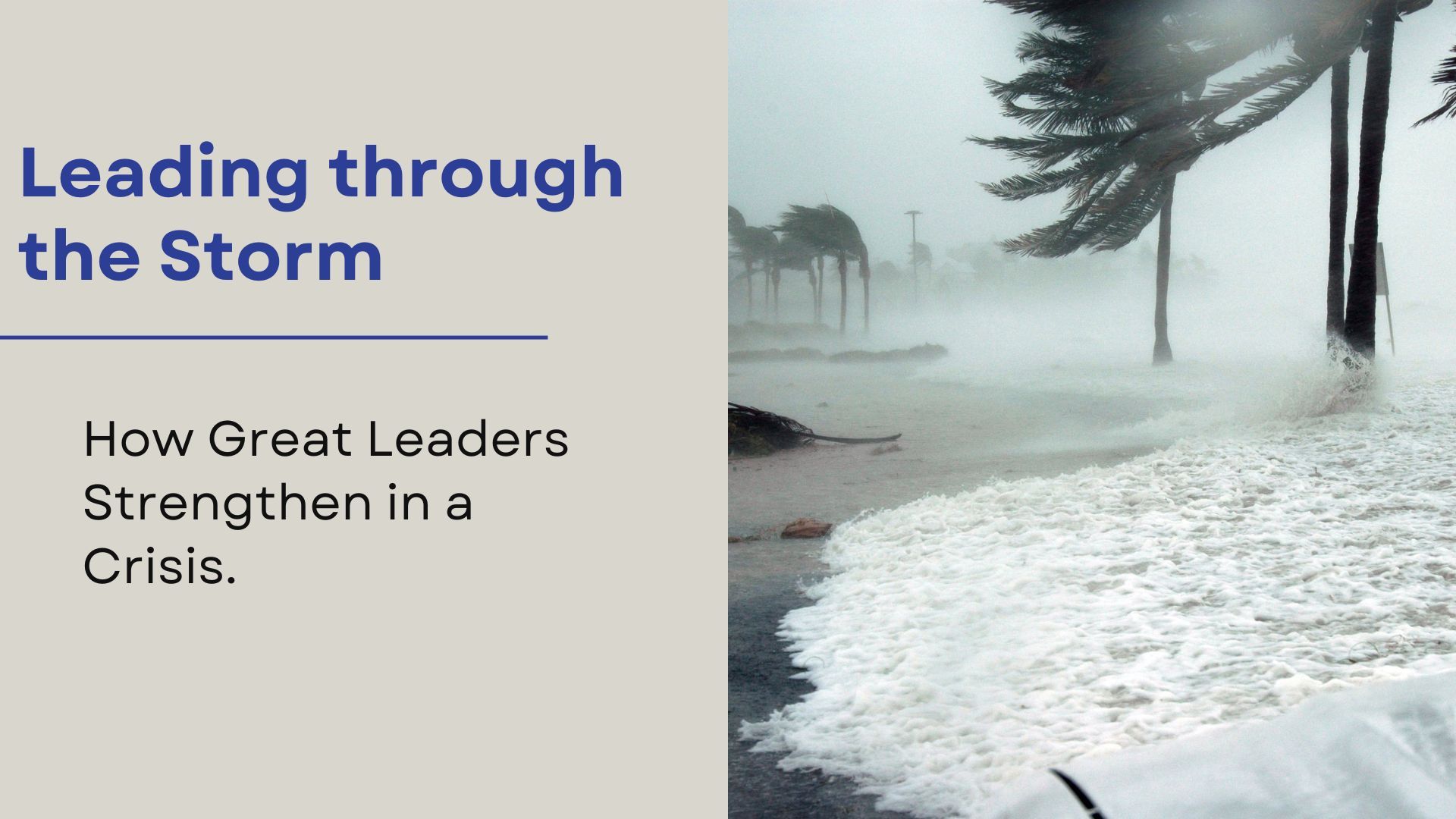Leading through a Storm: How to Strengthen in a Crisis
Jun 15, 2025
There’s never a good time for a crisis. They arrive fast, uninvited, and always inconvenient. Whether it's a financial downturn, a PR nightmare, a health emergency, or internal disruption, a crisis is the true test of leadership.
Here’s the uncomfortable truth: every leader will face one or two or 10 in their lifetime.
The question isn’t if—it’s how you’ll respond.
Some panic. Some freeze. But the best? They lead through it—and come out stronger.
So, how can you do it too?
You know me, I’m all about sharing practical advice. I’ve got some tips to help you lead with courage, clarity, and resilience—when the pressures on.
Stay Calm and Lead On
“You must be calm in the storm. People will do what they see, not what they’re told.”
— John C. Maxwell, leadership expert and author
The first rule of crisis leadership? Manage yourself before you manage others. I know a lot of leaders who don’t own their emotions. They like to pretend leadership is easy. IT'S NOT! I’m not afraid to show my team, I’m human too. These days are tough, but I know we can come out the other side stronger together.
When fear and uncertainty hit, your team is watching. Your tone, your body language, your confidence (or lack of it)—it all sends signals. Panic is contagious. But so is calm.
Try this:
Before major meetings, take five minutes to pause. Breathe. Center yourself. Write down three things you can control today—and lead from there. It helps me a lot to focus on what I can control instead of what I can’t.
Say this to your team:
“I know things feel uncertain, but we’ll face this together—one clear step at a time.”
Communicate Clearly—and Often
“In a crisis, tell people what you know, what you don’t know, and what you're doing to find out.”
— Andy Stanley, leadership communicator and pastor
Silence creates anxiety and often leads teams to create their own narratives of misinformation. Overcommunication creates trust.
You don’t need to have all the answers. But you do need to show up consistently, tell the truth, and give your people something to hold onto.
Try this:
Create a daily or weekly communication rhythm during the crisis. Short updates. Honest tone. Open Q&A. Show that you're not hiding or spinning anything.
Say this:
“Here’s what we know as of now. Here’s what we’re doing. And here’s what we’re still working to understand.”
Prioritize People Over Perfection
“Take care of your people, and they’ll take care of the mission.”
— General Colin Powell, former U.S. Secretary of State
Crisis brings chaos—but it also reveals character. Now’s the time to lead with empathy, which means taking the time to understand how your team is feeling. It doesn’t mean eliminating accountability.
Your team may be scared, distracted, or stretched thin. Don’t just push for performance—check in on well-being. Ask better questions. Offer flexibility when possible. People remember how you made them feel during hard times.
Try this:
Start your meetings with a quick pulse check: “How’s everyone really doing today?” Model vulnerability to invite honesty.
Say this:
“I care about you—not just your output. What support do you need right now?”
Focus on the Mission, Not the Mayhem
“You don't rise to the occasion. You fall to your level of training.”
— Navy SEAL saying (quoted in Jocko Willink’s Extreme Ownership)*
In a crisis, it’s easy to get consumed by headlines, hypotheticals, and worst-case thinking. Worst case strategizing is often my first line of defense. Plan for the worst and hope for the best is my way of handling challenges. Effective leaders zoom out and refocus the team on purpose.
What is your mission? Why does it still matter?
Try this:
Remind your team of the “why” behind what you do. Anchor in values. Then clarify short-term goals that move you forward.
Say this:
“Our mission hasn’t changed—just the path we take to get there. Let’s adapt, not abandon.”
Decide, Adapt, Repeat
“In a crisis, 80% confidence is better than 100% certainty too late.”
— Dr. Atul Gawande, surgeon and author
Waiting for perfect information often leads to missed opportunities—or worse, paralysis. Crises demand decisiveness with humility. Make the best call with what you know, then adjust fast.
Try this:
Set a 48-hour decision cycle. Make clear, time-bound calls. Then reassess based on results, not assumptions.
Say this:
“We’re going to move forward with this plan—and we’ll review it in two days based on what we’ve learned.”
Tough times are the great leadership amplifier. They bring pressure, yes—but also the opportunity to show up with strength, empathy, and integrity.
If you’re in a storm right now, don’t try to be perfect. Just be present, purposeful, and persistent.
Because how you lead in crisis… is how people will remember you when it’s over.
I’m going to leave you today with this question.
What’s one leadership move you can make today to help your team feel safer, seen, and supported?